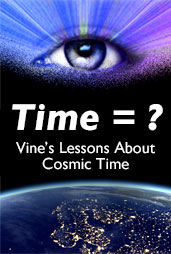- BOOK a Reading
- Accurate Psychic Readings
- Vine's YouTube Channel
- Vine's Podcasts
- Vine's Psychic TIPS
- Phone Psychic Readings
- Psychic Readings PayPal
- Online Psychic Editorials
- Vine Psychic Line FAQ
- Vine Psychic Reviews
- Psychic Predictions
- Psychic Glossary
- Psychic News & Articles
- Vine Psychic Line BLOG
- Spiritual Events
- Numerology Readings
- Dream Psychic Readings
- Spiritual Gossip
- Universal Laws of Nature
- Vine's Philosophy
- Art and Spirituality
- Astrology
- Spiritual Health
Vine Psychic Predictions > Free World Wide Web Usage? Not for much longer.

Psychic Prediction by Vine Psychic - 12th June 2011
Free World Wide Web Usage? Not for Much Longer if you are a Business Domain
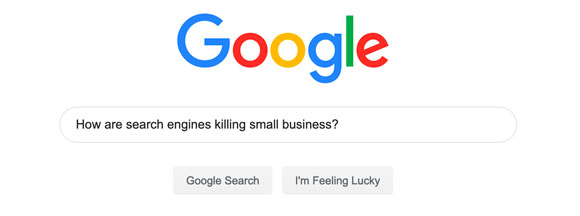
Spirit is guiding that the large search engine companies are about to change the way they do business. Google, Yahoo and Bing are looking for ways to increase advertising dollars and want business customers to pay when their businesses are listed under their banner
What does this mean for a business that currently doesn't use Google Ads or similar advertising?
As I tune into the software being upgraded by the I.T. engineers, I see software being designed to stop businesses that don't purchase search engine advertising, from being found. Search Engine companies want you to move with the times and that's all about paying for your search engine listings. If you want to be found on the web, then in the future you will have to pay.
This is going to have the original developers of the web crying-foul as the web was meant to evolve and be free. The web news isn't going to be dull when these changes begin to become more noticeable.
Even the SEO companies who have been able to play rough-shot with black hat SEO and affiliate link sharing are going to be scratching their head with these changes. Exciting times for the future of the world-wide-web market…
UPDATE: 24th November 2024
Pressure on Google to sell Chrome
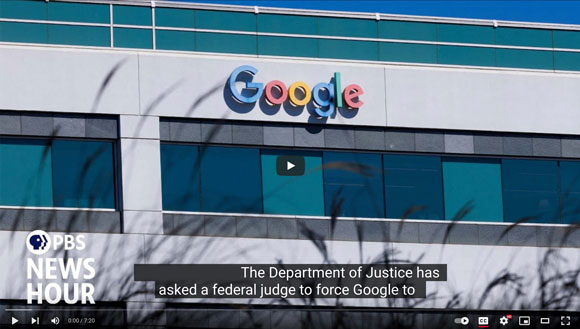
Dept of Justice pressures Google to sell Chrome... because Google has "has too much power"
Four months ago, Google was found to have an illegal monopoly in the US (see last update below).
Now the US Dept of Justice (DOJ) has asked a federal judge to force Google to sell its Chrome web browser.
As Chrome dominates two-thirds of the internet browsing market and Google preferences itself whenever you search for something within Chrome, Chrome is a central part of Google's business model.
The DOJ also asked a judge to force Google to stop making deals with phone makers to have Google Search as the default browser on their devices, and to either stop self-preferencing its own products or be forced to divest from its Android mobile operating system.
The result is just as Vine predicted... if you're a small business and you don't use Google products and Google ads, your competitors will be found before you.
Vine's prediction has come true:
"If you want to be found on the web, then in the future you will have to pay."
And because of Google's "unfair" monopoly, it is Google you will have to pay.
UPDATE: 8th August 2024
Google has an Illegal Monopoly - It's Official
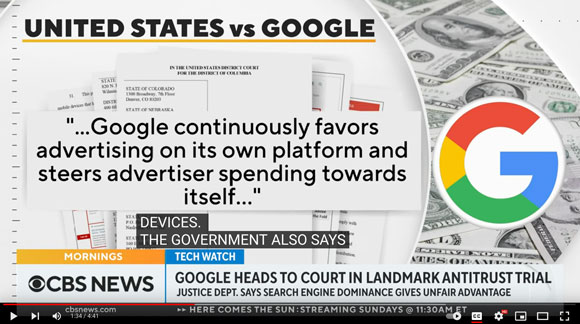
The biggest U.S. antitrust trial in decades has handed down its verdict...
A U.S. federal judge has ruled that Google has an illegal monopoly in the US.
The US Department of Justice set out to prove that "Google continuously favours advertising on its own platform and steers advertising spending towards itself".
Another of the DOJs allegations ruled on by the judge:
"Google’s ability to manipulate ad prices, means that publishers end up at the mercy of a monopoly that once promised them prosperity in their transition to the web."
Justice Department lawyers argued that "Googles monopoly enabled it to charge advertisers artificially high prices while also enjoying the luxury of not having to invest more time and money into improving the quality of its search engine."
The result of all this is Vines 2011 prediction of needing to pay to be found in internet searches.
This is how it happens...
- Googles monopoly (94.9% of the market on mobile devices) means your business must be found on Google as opposed to other search engines.
- Google advertising "manipulation" means that the top results for business searches on Google are paid advertisements, which means there is little chance your business will be found in organic searches.
- So if you want your business to be found on Google's monopoly, you are forced to pay their ever-changing advertising fees to be found in the flood of Google ads.
- Before the internet, there were set fees for advertising and you knew exactly where your ad would appear for the money you paid. Now the price is set by an online auction in which the price goes up and up as people out-bid each other to get their ad placed before their competitors. Where your ad appears and how much you pay to get it there, can be a crapshoot.
- In 2024, the average price you pay Google every time someone clicks your ad is $4.66. In competitive searches you may need to pay much more than that for your ad to found and clicked. And that doesn't mean you've made a sale, it just means someone clicked the ad. And that someone could very well be your competitors pushing up your advertising costs by clicking your ad with no intention of buying anything.
- Considering that this advertising payment scheme is operated by a company with a monopoly on its services, it means you are forced to pay those auction-inflated prices if you want your business to survive.
The Effect of Googles Monopoly on Small Businesses
Many small businesses with limited advertising budgets, simply cannot afford to compete for ever increasing ad prices in the monopolised Google-ad auction system.It begs the question: How many small businesses have been destroyed by these cut-throat advertising policies?
The "monopoly" ruling by the US Dept of Justice paves the way for a second trial to determine potential remedies, which hopefully will change the landscape of the online advertising world dominated by Google.
In 2011, Vine said that the news isn't going to be dull when the web advertising problems she predicted, begin to become more noticeable.
Suffice to say, the things Vine predicted have now become more noticeable.
UPDATE: 3rd August 2024
Search Engines Worse Than Ever
Were you in any doubt?Have you noticed how difficult it is now to find anything on Google and other search engines?
Have you noticed that what they mostly serve up to you is ads?
Have you realised what this means? It means that businesses can't be found on Google and other search engines unless they pay Google exorbitant amounts of money to be found, and if you can't afford to pay, you don't get found.
Vine's Prediction now 100% TRUE
All of this and more, Vine predicted 13 years ago.
UPDATE: 14th September 2023
US Dept of Justice Takes Google to Court
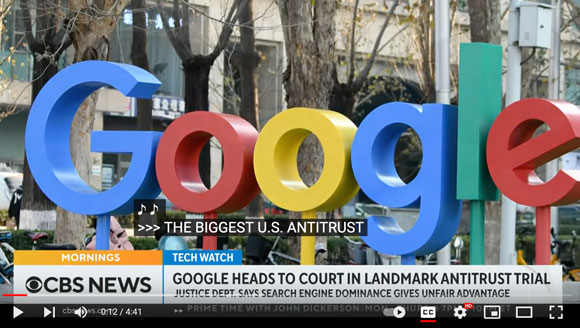
The biggest U.S. antitrust trial in decades gets underway in September 2023 as the U.S. Department of Justice takes on Google.
Vine's Prediction TRUE
Over the years in the updates to this prediction we have detailed the ways businesses now have to pay search engines to be found on the internet and how this severely limits choice and sends many small businesses out of business.Now, the US Dept of Justice (DOJ) and 14 states, have accused Google of illegally limiting online search options.
The US Govt claims that Google illegally pays billions of dollars to companies like Apple, Samsung and LG to make Google the default search engine on your phone and computer, and shut out rivals like Microsoft Bing and Duck Duck Go.
The Govt says this allows Google to dominate nearly 90% of all searches in the US, and 95% of searches on mobile devices.
The DOJ claims this leads to Google charging advertisers higher prices, “continuously favouring advertising on its own platform and steering advertiser spending towards itself.”
This means you are even more likely to be pushed to the Google-monopoly where you'll see the first few pages of your search filled with paid adverts.
So you are more likely to only see information from the highest bidders and you'll perhaps never see the best search result for you.
You probably won't even realise that the best result for your search is being kept from you because the business couldn't afford Google's monopoly advertising-bidding-war prices.
The end result of all of this is, if you choose not to give Google all your business data for free, and lots of money to enter into their very expensive advertising bidding wars, your business will be very hard to find on the web - the one place it needs to be found.
"If you want to be found on the web, then in the future you will have to pay." - Earth Seer VINE, 2011
UPDATE: 13th February 2020
Pay for Web Advertising or Lose Your Rankings
When Vine first made this psychic prediction, it was easily possible to get your small business found on the first page of organic web search results, using good SEO practices.But Vine predicted that would change. She predicted that businesses would have to pay to be found in the first few pages of a web search.
"Google, Yahoo and Bing are looking for ways to increase advertising dollars and want business customers to pay when their businesses are listed under their banner."
Vine's prediction was spot on.
Any web search for a business today, requires wading through a sea of paid search engine ads, Google Place listings, directories and review sites that more than likely show fake bad reviews of the business you are looking for, before you see the actual business listing.
It is now almost impossible for businesses to be found on the first page of search results, without paying for ads or directory listings. So unless your business is ranked in the Google Places directory or you pay Google for an ad, your business won’t get any business.
The problem is much worse on mobile phones where a lot more scrolling is required to get past the paid ads.
Nowadays, the recommended SEO strategy to get your website found, is to pay, pay, pay and keep paying:
- Pay for Google Ads- which can be very expensive for small businesses to compete in a bidding system with large companies.
- Pay for directory listings
eg: Yellow Pages etc.. which create web sites that are directly connected to Google Maps and business to business partnerships that use algorithm rankings to discredit non-paying businesses, and favour those that do pay. - Hope you don’t get fake bad reviews on those directory sites that Google will display before your legitimate listing.
- Make sure you give all of your information to Google for free, and hope they will list you in a Google Places web search listing.
Vine's psychic prediction from eight years ago, has come true: "If you want to be found on the web, then in the future you will have to pay."
UPDATE: 8th July 2019
Businesses Now Paying to be Found on Web
In 2011 when Vine made this psychic prediction about businesses having to pay to be found in web searches, normal search results for Australian small businesses that don't contain paid ads (organic search results), were still appearing at the top of web search pages.But not anymore.
Since Vine made this prediction, paid search results such as Google Ads have been slowly pushing "free" organic searches off the first pages of web results.
When Google's algorithms detect that a web search has "commercial intent", it displays up to four ads at the top and bottom of the page, which pushes down any organic results on desktop computers and makes long scrolls necessary on mobiles before any organic searches are found.
This means that small businesses in Australia are far less likely to be found in organic searches under their own business name and instead, they are being forced to pay exorbitant pay-per-click advertising fees for ads that aren't necessarily helping them or the Australian economy.
How Does Small Business Not Being Found in Searches, affect the Economy?
Google makes $billions of dollars in Australia, almost all of it from advertising revenue from Australian businesses, and yet Google pays almost no tax in Australia. Because of the competitive auction-like way Google has set up its advertising, only the richest businesses can afford to keep advertising.Australian small businesses are burning up their web advertising budgets without gaining significant results. All of that wasted advertising money is being siphoned out of the Australian economy by overseas companies that don't pay tax in Australia.
Then, when Australian small businesses can no longer afford to compete for web advertising, they are stopped in their tracks, just as Vine spiritually predicted.
How Search Engines are Charging Businesses to be Found on the Web
Google has been increasing the number of ads on the top and bottom of web pages. They now take up a lot of space on the first few pages of search results, leaving less space for normal search results that do not pay to be placed on top.On many desktop computers this means that small businesses no longer have any chance of appearing at the top of the page when it first loads in (above the fold).
Businesses that used to be found on the first page in organic searches are now pushed to the second and third pages, and that is only if they spend enough time and/or money on being found in organic SEO search results.
Furthermore, since voice activation methods like Siri, Amazon Echo and Google Home now stop people from sighting all the search results and ads, they are unable to identify a credible business, from an imposter. (See fake Google Maps business listings below).
As business searches are pushed further back from the first page they are being clicked less and the problem gets worse.
You now have to scroll past ads for other businesses using keywords specifically designed to have their ads placed before businesses that may better suit your needs. It's worse on mobile phones where initial search result screens are now completely taken up with ads. Much more scrolling is required before organic search results are found.
Fake Businesses on Google Ads
And it gets worse... Unless small Australian businesses can afford to internationally trademark their brand name, Google Ads even allows other businesses to falsely use the business names of their competitors.(The ACCC tried to stop Google from doing this, but lost the court case). So it remains possible to click on one business that hijacks business names, and uses cloaking websites in order to steal their customers. Google allows this to happen.
11 Million Fake Businesses on Google Maps
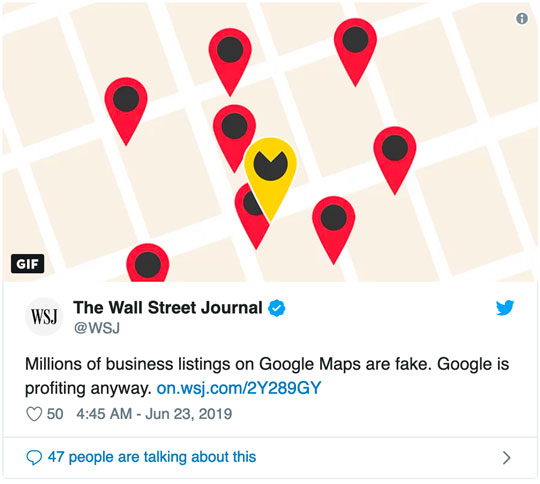
According to the Wall Street Journal, Google Maps is filled with millions of scam operations that are impersonating real businesses. In fact the Wall Street Journal says there are 11 million fake businesses on Google Maps, all trying to scam you, and Google allows this to happen and they siphon billions of dollars from the Australian economy.
No wonder Google felt they could no longer keep the slogan "Don't be Evil".
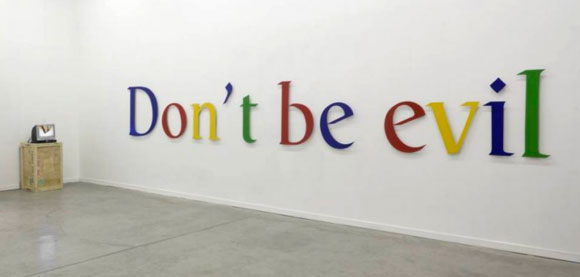
Google no longer uses the slogan "Don't be evil'
Advertising Wars that Small Business Can't Win
Google has started an internet advertising war between big and small business and international businesses using Australian business address listings that aren't actually located in Australia. It is a war that small business cannot win.Businesses no longer have a set cost for advertisements. They are now forced to bid against each other on a pay-per-click basis to have their ads appear at all and even to be found under their own business or brand name. The cost of Google Ads can start as low as $1 per click, but in reality that's never going to be enough in an auction where only the highest bidder has their ad shown.
The truth is, businesses pay exorbitant advertising costs. The resulting cost of advertising on the web can easily run into hundreds of thousands of dollars in competitive listing classifications.
It is a bidding war in which small businesses just can not compete. The amount of small businesses going into liquidation (some long term businesses) are resulting in more people trying to find employment and putting greater pressure on social services.
So, just as Vine predicted, the search engines are making businesses pay to be found on the web, and this is sending many smaller businesses into liquidation.
UPDATE: 14th January 2018
The End of Internet Neutrality
In December 2017, the US Federal Communications Commission (FCC) voted to end Internet Neutrality.The net neutrality rules prevented internet providers from blocking or artificially slowing internet traffic for anybody who doesn't pay for the 'normal' faster speed.
Just as Vine predicted, ending Net Neutrality increases the chances of businesses having to pay to be found on the internet. Vine predicted, "If you want to be found on the web then in the future you will have to pay".
How the Ending of Net Neutrality Costs You More
People are significantly less likely to visit a site if it is too slow, and search engines like Google already penalise sites for being too slow. Ending net neutrality means your web site could be artificially slowed unless you pay extra and that in turn means your site will not be found, unless you pay. Those who can least afford to pay, will suffer the most.Paying to be found in web searches is exactly what Vine predicted in 2011.
Businesses are Already being Forced to Pay
Search Engine Companies like Google have already eroded the neutrality of the web by introducing paid listings that take up the entire mobile phone screen that shows your search results. (See: above the fold).To see the regular unpaid-for search results that correspond to your search criteria, you often have to scroll a long way down, past many search result ads that paid to be found first.
So, right now, this means that businesses (or anybody) that need to be found in the first few screens of a web search, must pay Google or other search engine companies, to be found at the top of web searches.
These ads (i.e. Google Ads) are paid for on a per-click basis. The more you pay in relation to what others are prepared to pay, the higher the search engines will place your ad.
Vine's Prediction has Come True
This means that businesses are bidding against each other to be found higher in your search. Businesses can pay as much as $1-$50 every time someone clicks their ad and goes to their site.Businesses are already being forced to pay to found in search engine listings and the vast majority of small businesses simply can't afford it.
Vines prediction is accurate.
UPDATE: 23rd February 2015
Paid Inclusion - Web Searches
Paid inclusion is a search engine marketing tool in which Web site owners pay the search engine company to guarantee that their sites will show up in organic search results. Many older search engine companies originally used 'paid inclusion' as a revenue raiser but phased it out because Google was not using it.Vine's Prediction Comes True
Google Embraces “Paid Inclusion”
But less than a year after Vine's psychic prediction about search engines introducing payment for organic searches, Google performed a complete about-face. In 2012, Google introduced paid inclusion within its search engine family of products.
Google Flights, Google Hotel Finder, and Google Shopping, introduced after Vine's psychic prediction, are all new forms of paid inclusion programs. The concern is that Google's use of paid inclusion is just the beginning of an attempt to have paid inclusion pushing organic rankings below the fold, and thus make payment necessary for all businesses trying to be found in organic searches.
• Related Predictions
Controllers of the Internet
Vine's prediction about the select few rich and powerful people who control what you see and don't see on the internet.Read it here: Controllers of the Internet & Economies
Censorship of Social Networks – Political & Corporation Interference of World Democracy
Vine predicted the censoring of social media by wealthy individuals trying to stop free speech and control what you see - Read the PredictionFREE WILL - Exposing the Secrets
Along with attacks on our freedoms, digitisation of all of our personal information and the relentless push for a cashless society, there has also been an increased push to try and convince us that our Spiritual Free Will does not exist - Watch the video on Vine's Youtube Channel
Book a Reading
Australian & International Bookings
Secure PayPal, Credit Card or Debit Card
Secure PayPal, Credit Card or Debit Card




